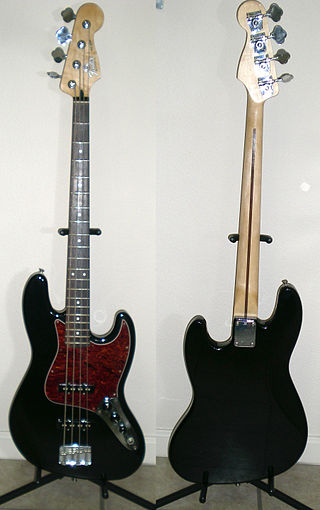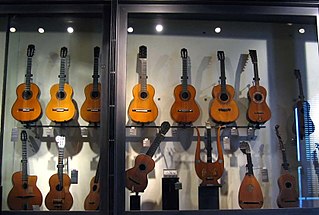
The bass guitar, electric bass or simply bass is the lowest-pitched member of the guitar family. It is a plucked string instrument similar in appearance and construction to an electric or acoustic guitar, but with a longer neck and scale length. The bass guitar most commonly has four strings, though five- and six-stringed models are also relatively popular, and bass guitars with even more strings or courses have been built. Since the mid-1950s, the bass guitar has largely come to replace the double bass in popular music due to its lighter weight, the inclusion of frets in most models, and, most importantly, its design for electric amplification. This is also due to the fact that the double bass is acoustically compromised for its range in that it's scaled down from the optimal size that would be appropriate for those low notes.

An electric guitar is a guitar that requires external amplification in order to be heard at typical performance volumes, unlike a standard acoustic guitar. It uses one or more pickups to convert the vibration of its strings into electrical signals, which ultimately are reproduced as sound by loudspeakers. The sound is sometimes shaped or electronically altered to achieve different timbres or tonal qualities from that of an acoustic guitar via amplifier settings or knobs on the guitar. Often, this is done through the use of effects such as reverb, distortion and "overdrive"; the latter is considered to be a key element of electric blues guitar music and jazz, rock and heavy-metal guitar-playing. Designs also exist combining attributes of the electric and acoustic guitars: the semi-acoustic and acoustic-electric guitars.

The guitar is a stringed musical instrument that is usually fretted and typically has six or twelve strings. It is usually held flat against the player's body and played by strumming or plucking the strings with the dominant hand, while simultaneously pressing selected strings against frets with the fingers of the opposite hand. A guitar pick may also be used to strike the strings. The sound of the guitar is projected either acoustically, by means of a resonant hollow chamber on the guitar, or amplified by an electronic pickup and an amplifier.

Neck-through-body is a method of electric guitar construction that combines the instrument's neck and core of its body into a single unit. This may be made of a solid piece of wood, or two or more laminated together. The strings, nut, fretboard, pickups and bridge are all mounted on it, with additional body side components filling out its full shape glued or mechanically attached are referred to as "wings". The technique is also used on electric bass guitars.

Music Man is an American guitar and bass guitar manufacturer. Originally formed in 1971 by Forrest White and Tom Walker, along with Leo Fender as a silent partner, the company started manufacturing electric and bass guitars under the Music Man name in 1974. In 1984 it was acquired by Ernie Ball, the subsidiary of which is branded as Ernie Ball Music Man.

The Fender Jazz Bass is the second model of electric bass created by Leo Fender. It is distinct from the Precision Bass in that its tone is brighter and richer in the midrange and treble with less emphasis on the fundamental frequency. The body shape is also different from the Precision Bass, in that the Precision Bass has a symmetrical lower bout on the body, designed after the Telecaster and Stratocaster lines of guitars, while the Jazz Bass has an offset lower bout, mimicking the design aesthetic of the Jaguar and Jazzmaster guitars.
Steinberger is a series of distinctive electric guitars and bass guitars, designed and originally manufactured by Ned Steinberger. The name "Steinberger" can be used to refer to either the instruments themselves or the company that originally produced them. Although the name has been applied to a variety of instruments, it is primarily associated with a minimalist "headless" design of electric basses and guitars.

Alembic is an American manufacturer of high-end electric basses, guitars and preamps. Founded in 1969, the company began manufacturing pre-amps before building complete instruments.
Warwick Lancelot Armstrong "Rick" Turner III, was an American builder of guitars and basses, ukuleles, and other stringed instruments. As a guitar builder, Rick created instruments for rock musicians including Lindsey Buckingham, John Entwistle, and Jesse Colin Young.

The Gibson Explorer is a type of electric guitar model by Gibson guitars, released in 1958. The Explorer offered a radical, "futuristic" body design, much like its siblings: the Flying V, which was released the same year, and the Moderne, which was designed in 1957 but not released until 1982. The Explorer was the final development of a prototype design that, years later, Gibson marketed under the name Futura.

Zon Guitars is a US manufacturer of bass guitars founded in 1981 by Joseph Zon. The company is known for its use of non-traditional designs and materials. Zon Guitars is associated with endorser and player Michael Manring, who collaborated with the company in the mid-1990s to design the innovative Zon Hyperbass instrument, a bass guitar that enables the player to retune the instrument during play.

The following outline is provided as an overview of and topical guide to guitars:
The truss rod is a component of a guitar or other stringed instrument that stabilizes the lengthwise forward curvature of the neck. Usually, it is a steel bar or rod that runs through the inside of the neck, beneath the fingerboard. Some are non-adjustable, but most modern truss rods have a nut at one or both ends that adjusts its tension. The first truss rod patent was applied for by Thaddeus McHugh, an employee of the Gibson company in 1921, though the idea of a "truss rod" appears in patents as early as 1908.
The Guild Guitar Company is a United States-based guitar manufacturer founded in 1952 by Alfred Dronge, a guitarist and music-store owner, and George Mann, a former executive with the Epiphone Guitar Company. The brand name currently exists as a brand under Córdoba Music Group. In February 2023, The Yamaha Guitar Group acquired Cordoba Music Group.
Electric guitar design is a type of industrial design where the looks and efficiency of the shape as well as the acoustical aspects of the guitar are important factors. In the past many guitars have been designed with various odd shapes as well as very practical and convenient solutions to improve the usability of the object.
The Fender American Deluxe Series was a line of electric guitars and basses introduced by Fender in 1995 and discontinued in 2016. It was upgraded in 2004 and 2010 before being replaced by the American Elite series in 2016.
Jens Ritter Instruments is a manufacturer of high-end electric string instruments. It was founded by Jens Ritter in the mid-1990s and was known as Ritter Bass Guitars until 2010 when Jens expanded his line to include guitars. Jens produces 50 to 60 handmade instruments each year in his shop located in the small wine town of Deidesheim,Germany.
The Fender Telecaster, colloquially known as the Tele, is an electric guitar produced by Fender. Together with its sister model the Esquire, it was the world's first mass-produced, commercially successful solid-body electric guitar. Its simple yet effective design and revolutionary sound broke ground and set trends in electric guitar manufacturing and popular music. Many prominent rock musicians have been associated with the Telecaster for use in studio recording and live performances, most notably Bruce Springsteen, Luis Alberto Spinetta, Keith Richards and George Harrison.

Dingwall Designer Guitars is a manufacturer of bass guitars and electric guitars based in Saskatoon, Saskatchewan, Canada. It employs the fanned-fret system started by Novax Guitars for manufacturing basses, increasing the scale length of the strings on the bass side of the guitar compared to the treble side. This design is more akin to a piano or harp, giving the bass strings length that increases the sustain.
Kiesel Guitars is an American manufacturer of custom electric guitars and electric bass guitars located in Southern California, with a heritage dating back to 1946. In 2015, Kiesel Guitars split from Carvin Corporation, taking the guitar and bass portions of Carvin.













